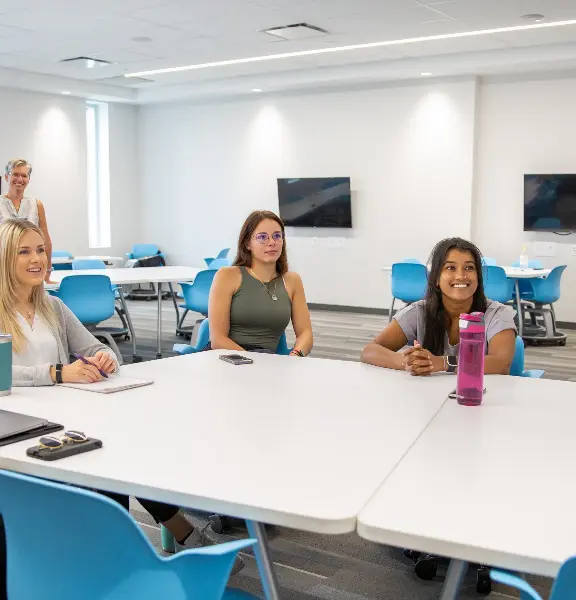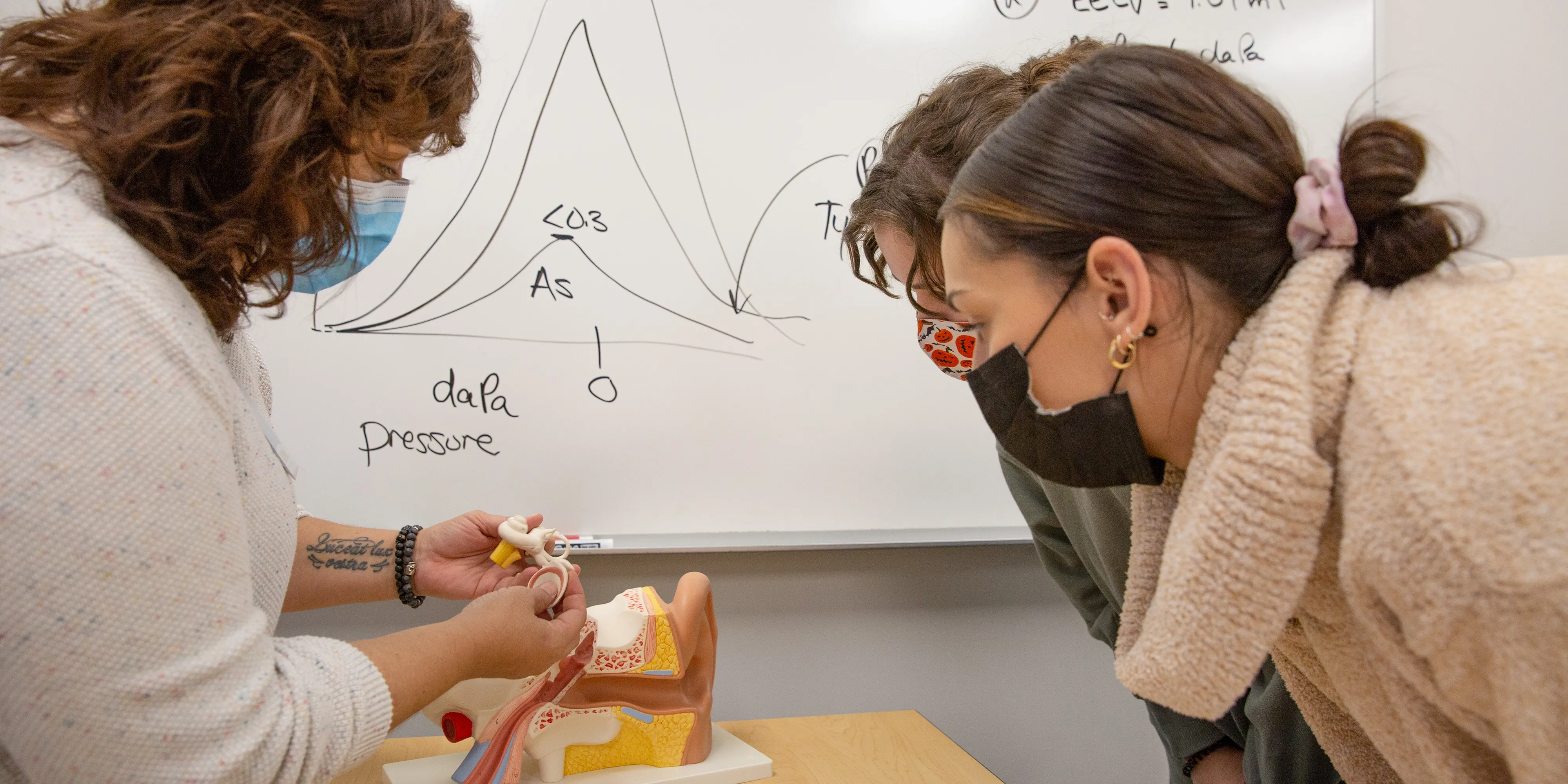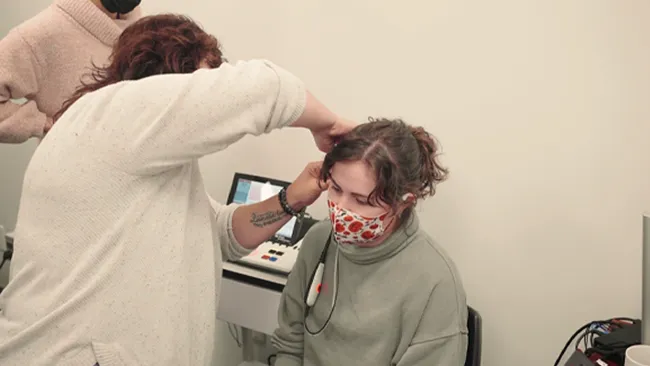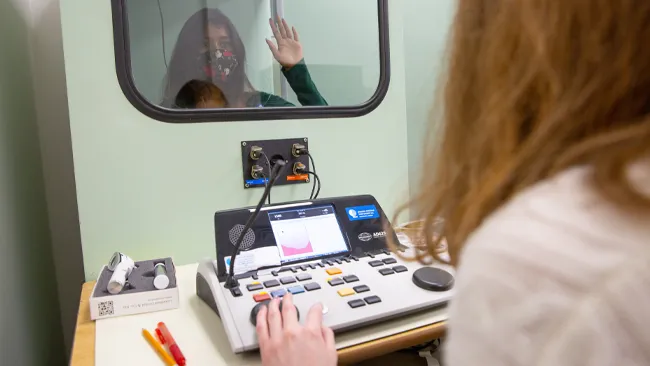

Communicative Disorders Assistant
Overview
Support and empower individuals impacted by communication disorders to reach their potential.
This Ontario College Graduate Certificate program is designed for students who wish to work as a communicative disorders assistant in a supportive capacity with a qualified speech-language pathologist and/or audiologist. This program runs in-person from September through August and prepares graduates to design and implement programming based on the assessments and treatment plans outlined by qualified speech-language pathologists and audiologists.
The Communicative Disorders Assistant profession is not governed by a regulatory body or college so as a result, there is no accreditation pathway for this program. Lambton College itself is an accredited college and this program is recognized by the Communicative Disorders Assistant Association of Canada as having met or exceeded the association's standards.
Experiential Learning Highlights
Admission Requirements
- Applicants must have completed, at minimum, a post-secondary diploma or degree with emphasis on speech and language development, communication disorders, linguistics, human anatomy, physiology, social sciences, or health and community services.
- Applicants are required to submit a transcript of their post-secondary diploma or degree.
Meet Shea
Costs
- Year 1 $6,075.72
Please Note: These fees apply to the 2025-2026 academic year and are subject to change. Fees do not include books (unless specifically noted), supplies or living costs.
Technology Requirements
In order to keep pace with the requirements of each and every course in your program, Lambton College requires that each student have access to a laptop while studying at our college.
Audiology Lab
Courses
Anatomy & Physiology of Speech Mechanism
This course will introduce key terms of anatomy and physiology used by Speech-Language Pathologists. The basic structure and function of the systems that underlie the production and perception of speech, language, cognitive communication and swallowing will be explored. Typical development and function of the structures of respiration, phonation, articulation and the nervous system will be emphasized. Reference will also be made to several communicative disorders and their clinical implications.
Child Language Acquisition & Related Disorders I
This course will provide learners with an overview of typical language development. Learners will be exposed to various screening and assessment approaches and reports. The nature of language disorders will be explored with respect to the impact on the child, the family/caregivers, and community. Language intervention approaches and strategies will be presented. The role of the Communicative Disorders Assistant in implementing program recommendations will be emphasized throughout.
Introduction to Communication Disorders in Adults I
Course emphasis is on the communication disorders of the adult population. Basic neuroanatomy as well as normal speech and language functions will be reviewed, along with changes to these areas seen during the normal aging process. Acquired communication disorders, their cause and neuroanatomical basis will be examined, with a particular focus on those acquired conditions following stroke. The impact on patients, families and caregivers will be addressed. In addition, students will be exposed to assessment protocols and the various intervention methods and treatment approaches available.
Clinical & Professional Issues I
The focus of CDA 1012 is to introduce students to the field of human communication disorders. Students will learn the roles and scopes of practice of Communicative Disorders Assistants, Speech-Language Pathologists and Audiologists, and will examine key documents on the use of supportive personnel. Pertinent associations (CASLPO, SAC, OSLA, and CDAAC) will be discussed. Students will be introduced to a variety of methodologies used in management of communication disorders, record keeping and data collection. The topics of clinical placement, working with a supervisor, preparation of resumes, community agencies, work settings and related professions will also be covered.
Introduction to Audiology
The fundamentals of sound, the human auditory mechanism and associated pathologies and syndromes will be examined. Basic audiological measures will be practiced to prepare the Communicative Disorders Assistant for the work environment. Test measures and topics specific to pediatric, adult, non-compliant and special-needs populations will also be explored. The course is designed to familiarize the student with the field of Audiology and the educational requirements to work within the field. The practical use of the equipment and computer software through in-class labs will provide the students with hands-on training of basic audiometric skills, audiometric equipment maintenance, and infection control in the Audiology clinic. The student's ability to understand etiology of a disorder/syndrome, its symptoms and treatment will help prepare the student for employment in a variety of clinical settings.
Articulation & Phonology
This course is designed to provide students with introductory skills and theoretical background pertaining to treatment methodology in the areas of articulation, phonology and oral-motor function. This course involves the study of speech sound production with some emphasis on the development of phonetic transcription skills and application of these skills in describing the speech of children. Content will include normal development of speech and oral motor milestones and sequences, distinction between delayed and disordered development, typical speech production errors and phonological patterns, determining the need for intervention, and the intervention process. Students will be exposed to a sampling of assessment reports, tools, intervention activities, as well as strategies reflective of various treatment approaches. The role of the Communicative Disorders Assistant in implementing program recommendations will be emphasized throughout the course.
Principles of Therapy Programming
This course introduces the foundational principles of therapeutic programming and intervention within the scope of practice for Communicative Disorders Assistants. Learners will develop essential skills in clinical observation, the design and implementation of therapy techniques, and the application of strategies to elicit, reinforce, and maintain target communication behaviours. Emphasis will be placed on accurate data collection, performance tracking, and the summarization of client outcomes to support effective treatment planning and documentation.
Diverse Populations
This course will provide learners with a comprehensive review of diverse populations with communication impairments. Presenting features, related communication impairments and their management will be presented. Learners will also explore the importance of a team approach to intervention. The family/parent perspective will be considered throughout the course. Overall course emphasis will be on developing empathy for the situations and circumstances surrounding people with disabilities and their caregivers to better work with these individuals in the future. This will be accomplished through presentations and interviews with guests from the community who have disabilities or care for and serve those with various disabilities. Current trends and issues will also be considered. The role of the Communicative Disorders Assistant in implementing program recommendations will be emphasized throughout.
Child Language Acquisition & Related Disorders II
CDA 2053 builds upon the coursework of CDA 1053 to advance the learners' understanding of and ability to provide language intervention services for school-aged children. Learners are exposed to screening and assessment tools, data collection methods, lesson plans, reports, language intervention approaches, intervention activities, and strategies reflective of various treatment approaches for this population. The developmental stages of early literacy, reading and writing will also be explored, along with intervention strategies for literacy skill development. The role of the Communicative Disorders Assistant in implementing program recommendations will be emphasized throughout.
Introduction to Communication Disorders in Adults II
The course is a continuation of CDA 1042. Communication, cognitive and swallowing impairments following stroke and degenerative neuromuscular conditions, will be examined in detail. Classification, assessment and treatments for dysarthria, apraxia, traumatic brain injury, dementia and dysphagia will also be discussed. Students will be exposed to assessment/screening protocols and treatment tools/methods pertinent to the conditions and impairments discussed. The role of the Communicative Disorders Assistant in the care of adults with communication, cognitive and swallowing impairments will be discussed throughout the course.
Introduction to Augmentative Communication & Technology
This course is intended to introduce students to a set of strategies and methods designed to temporarily or permanently assist, support, or enhance the communication of individuals with a variety of physical, perceptual, motor and cognition disabilities. Students will demonstrate an understanding of a range of augmentative and alternative communication systems and demonstrate an understanding of the programming and maintenance of those systems in addition to practicing various treatment methods. The role of the Communicative Disorders Assistant in implementing program recommendations will be a focus throughout this course
Field Practicum (7 Weeks)
Practicum I is designed to provide the CDA student with their initial experience working with a qualified Speech-Language Pathologist and/or Audiologist. The practicum placement provides the CDA student with the opportunity to incorporate and apply the knowledge and concepts covered in the preceding academic courses. The CDA student will spend a minimum of 245 hours at an approved agency, working under the supervision of a registered Speech-Language Pathologist and/or Audiologist. A series of competencies will be provided to demonstrate the students' desired learning outcomes. Support for the student will be provided collaboratively by agency and college staff.
Field Practicum II (7 weeks)
The second practicum helps the CDA student gain additional experience working in an assistive capacity with a qualified Speech-Language Pathologist and/or Audiologist. As with the first practicum the CDA student needs to spend a minimum of 245 hours at an approved agency. A series of competencies will be provided to demonstrate the students' desired learning outcomes. Support for the student will be provided collaboratively by agency and college staff.
Fluency & Voice Disorders
This course provides an introductory understanding of theoretical and clinical issues relating to voice and fluency disorders. It focuses on the characteristics and management of speech impairments associated with voice and fluency disorders. Intervention and prevention methodologies, as well as techniques and activities for facilitating transfer, maintenance, and generalization, are discussed. Emotional and psychosocial factors related to these disorders are also considered. The role of the Communicative Disorders Assistant in implementing program recommendations is emphasized.
Clinical & Professional Issues II
This course is designed to provide students with expanded skills and knowledge pertaining to professional behaviour and issues in the areas of speech-language pathology and audiology. Students will share diverse practicum experiences with each other. Professional issues such as professional practice, advocacy, and interactions with colleagues and clients will be emphasized and integral to the course. Job search strategies and preparation will also be discussed as well as current issues in the field through interactive discussions and activities.
Amplification Systems & Aural Rehabilitation
This course provides students with a broad understanding of the principles and methods of aural rehabilitation for hearing-impaired children and adults. Students will examine key principles of room acoustics, amplification technology, assistive listening devices, and person-centered care using a combination of theory, real life scenarios, and reflective exercises, with emphasis on the development of skills necessary for working in an audiology setting.
Contact
School of Fire Science, Health & Community Services
Program Information
After Graduation
Employment Opportunities

Our graduates support individuals of all ages with a variety of communication disorders as communicative disorders assistants, therapy and speech assistants, audiometric technicians, and hearing screeners.
Possible employers could be school boards, children's treatments centres, EarlyON Centres, hospitals, public health units, home and community care support services, or private speech or audiology clinics. Graduates can work nationwide.
Placement
Skills Acquired on Placement
- Students must complete two, full-time, seven-week placements under the supervision of a speech-language pathologist and/or audiologist.
- Students must acquire a minimum of 490 hours over the two placement terms.
- Placements include a combination of observation and application of practical skills and techniques in the fields of speech and language and/or audiology within a community setting.

Vaccinations & Police Record Checks
Students considering this program should be aware that there are field placement requirements. All placements require students to have police record checks. Proof of immunizations is also required and must be cleared through Passport to Placement.
Once you’ve applied, you can log in to mylambton.ca and view the program-specific Field & Clinical Placement Requirements. If you need information about these requirements before applying, please contact placementinfo@lambtoncollege.ca.
More Information
Technology Requirements
It is recommended that students purchase a laptop with a Windows operating system.
Internet Speed Requirements
For best performance for students learning remotely, an internet connection with a minimum of 40 Mbps download and 10 Mbps upload speed is recommended in order to effectively use video conferencing and remote lecture delivery software as well as, other online resources remotely. Due to the large area over which students may be dispersed, we are unable to recommend a specific provider, so you will need to inquire around your area to find one that best suits your needs.
Minimum Laptop Requirements
In order to access the internet and virtually-delivered software and courseware, student laptops should include the following at a minimum. By meeting the following specifications, students will be equipped to access software and courseware on their laptop through the internet:
- Intel i5 8th Gen Processor or equivalent
- 16 GB of RAM (with a minimum of 8 GB)
- 100 GB HDD or more
- HD Graphics
- Webcam with a microphone
- Wireless 802.11n/ac 5ghz capable
- Windows Operating System (Windows 11)
Please note that Chromebooks and MacBooks may not support all software required for your program; students should verify compatibility with their professors.
Software
To ensure students are getting the most our of their classroom experience, some software will be required.
Lambton College has made this software easily accessible online. Students can leverage our Microsoft Office 365 software packages and services. In addition, much of the software you require for your courses will be available on demand for use on any device - on or off campus.








